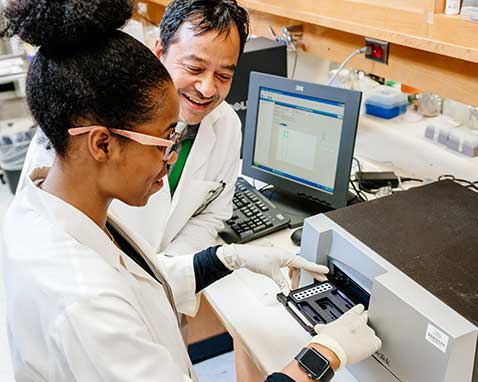 The Honors Neuroscience Summer Research Academy is a competitive program that allows students to make significant advances in their independent research projects while receiving individualized preparation for a competitive graduate or medical scientist training program application. Support is generously funded by the UAB Honors College Enrichment Fund, the Comprehensive Neuroscience Center, the Civitan International Research Center, the Center for Addiction and Pain Prevention and Intervention (CAPPI) and the Departments of Psychology, Neurobiology, Psychiatry, Biology and Neurology. The program starts on June 7th and runs through July 30th, during which time the students conduct research, attend and participate in all program-sponsored activities, and present their work at the end of the summer.
The Honors Neuroscience Summer Research Academy is a competitive program that allows students to make significant advances in their independent research projects while receiving individualized preparation for a competitive graduate or medical scientist training program application. Support is generously funded by the UAB Honors College Enrichment Fund, the Comprehensive Neuroscience Center, the Civitan International Research Center, the Center for Addiction and Pain Prevention and Intervention (CAPPI) and the Departments of Psychology, Neurobiology, Psychiatry, Biology and Neurology. The program starts on June 7th and runs through July 30th, during which time the students conduct research, attend and participate in all program-sponsored activities, and present their work at the end of the summer.
CAPPI 2025 Summer Research Academy Students

Amitis Moradkhani
Major: Neuroscience
Mentor: Dr. Stefanie Robel
Department: Cell Development and Integrative Biology
Research Summary: I am studying how astrocytes respond to traumatic brain injuries, investigating certain characteristics such as their ability to repair damage to the blood brain barrier.

Elizabeth Eason
Major: Biomedical Sciences
Mentor: Dr. HaoSheng Sun
Department: Cell Development and Integrative Biology
Research Summary: I am working in Dr. Sun's lab where I work with C. elegans to study chromatin factors and their role in Cocaine Use Disorder (CUD).

Isaiah Garder
Major: Neuroscience
Mentor: Dr. Lillian Brady
Department: Psychiatry
Research Summary: For my project, a mouse model would be used to study the effects of feminizing hormone treatment on dopamine pathways, addiction, and anxiety in biological males.
CAPPI 2024 Summer Research Academy Students

Melissa Mercer (Day)
My research project is on computational neuroscience and my target dataset contains 20 samples from rat striatal, cortical, and hippocampal neurons. My research goal is to detect how changes in gene expression differ between samples where the neuronal cultures were either treated with potassium chloride (KCl) or a vehicle (control). Differential gene expression analysis will be performed through the nf-core bulk RNA-Seq pipeline, which is an important tool that can be utilized to analyze RNA sequencing data, and more specifically the gene’s activity inside the rat brain. Understanding how the treated neurons affect changes in the activity-dependent transcription process is critical to identifying how KCl affects the neurobiology of brains. While this dataset has been previously analyzed in the context of looking for genes that are decreased in response to activation, it has not yet been processed with the nf-core RNA-Seq pipeline on the new rat genome assembly before, which is the overall objective of this research project.
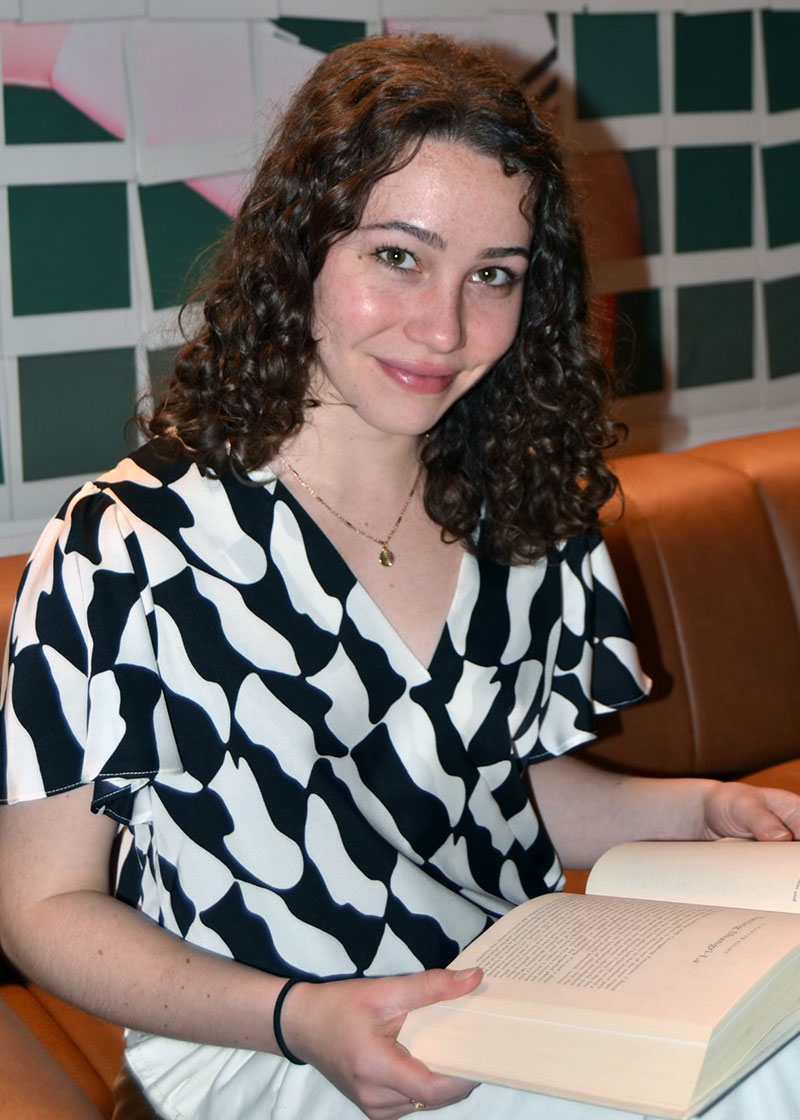
Lauren Assaf (Beas)
The aim of my research project is to investigate whether PVT neurons encode for casual associations (learned from previous experiences).
Motivation is a complex neuronal process that promotes the ability to direct and energize goal-oriented behavior correctly. Motivation deficits are one of the central core features of many psychiatric disorders. However, the neural pathways that orchestrate motivation and how these pathways go awry during psychiatric conditions are not fully known. Several factors influence motivation, such as internal states (e.g., hunger), cues associated with reward availability, and learned experiences obtaining a reward. My summer project will determine whether the paraventricular nucleus of the thalamus (PVT) plays a role in mediating the ability of individuals to learn associations between rewards and cues that predict rewards. For this, I will record the activity of these neurons while thirst mice learn to associate a cue (different tones) and their outcomes (food cue - delivery of strawberry milkshake; neutral cue - no outcome; and aversive cue - delivery of a bitter solution), respectively.

Ria Sethi (King)
One specific project we began when I joined focused on studying secondary tissue damage during ischemic stroke. With the support of the Honors College and the UAB Summer Research Academy, I would like to continue my research through Summer 2024. I spent the last summer researching and compiling preliminary studies for this stroke project, and I am planning on spending this semester and the following summer going more into depth with the experiments and scope of influence by focusing on additional factors. Specifically, we will be researching a different stroke model, the TMCAO stroke model, a temporary blockage of blood vessel. Another portion of study we will be assessing are the effects on behavior in the mice after injury.
Aisha Mesco (Heinsbroek)
My project would focus on investigating changes in structural neural plasticity underlying the anti-addictive therapeutic effects of tabernanthalog (TBG), a novel psychedelic-inspired compound. Unlike current OUD therapies, which target the endogenous opioid system, TBG targets the prefrontal cortex, a region crucial to executive functioning and regulation of drug seeking behaviors. Previous research has demonstrated that psychedelic compounds such as ibogaine can induce structural plasticity in the PFC and have anti-addictive properties, but also come with significant side effects such as cardiotoxicity. This project broadly addresses the challenges of treating opioid use disorder (OUD) by exploring the therapeutic effects of TBG, a non-cardiotoxic and non-hallucinogenic psychedelic compound.
CAPPI 2023 Summer Research Academy Students

Lydia Slocum, Neuroscience (Day)
Over the summer, my project would be focused on looking at immediate early gene changes following acute cocaine injection. I would be working on my own RNAscope protocol, learning brain slicing, and tissue extraction. I am also interested in sex differences so I would be analyzing males and females. Something I might expect to see is that females have an increased expression for the Fos gene in the combinatorial cells compared to males.
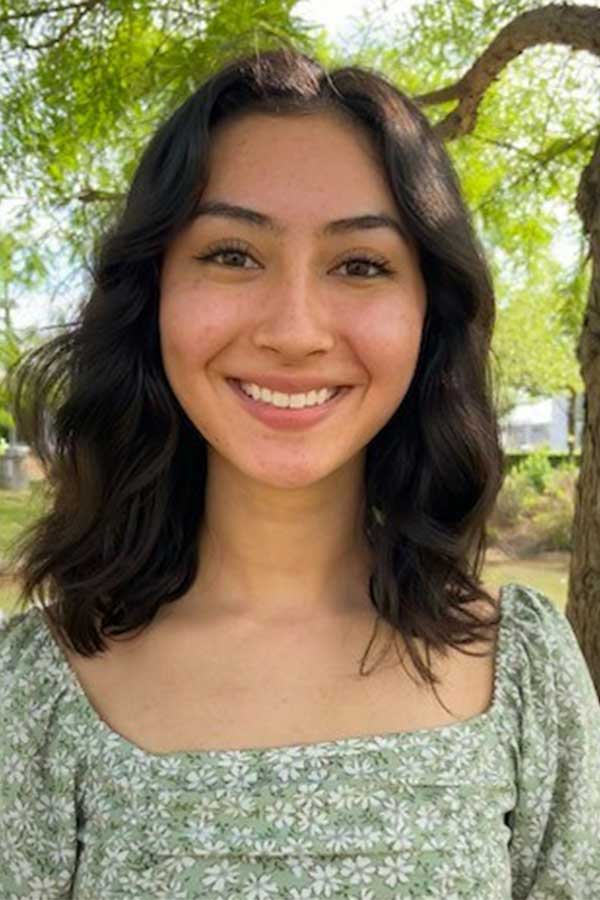
Angela Cleere, Psychology (Day)
My research for this summer will be focusing on using a human-derived astrocyte cell culture system to model changes in gene expression after acute drug experience seen in vivo. This model will be utilized to determine which neurotransmitter systems, receptors, and cell-signaling cascades are responsible for these transcriptional responses. I will also pilot a novel astrocyte-specific CRISPR/dCas9 tool to bidirectionally manipulate gene targets in astrocytes. This will allow for future investigation of which gene expression changes in astrocytes are necessary for functional changes in cell physiology and drug-seeking behavior in a rodent model system.
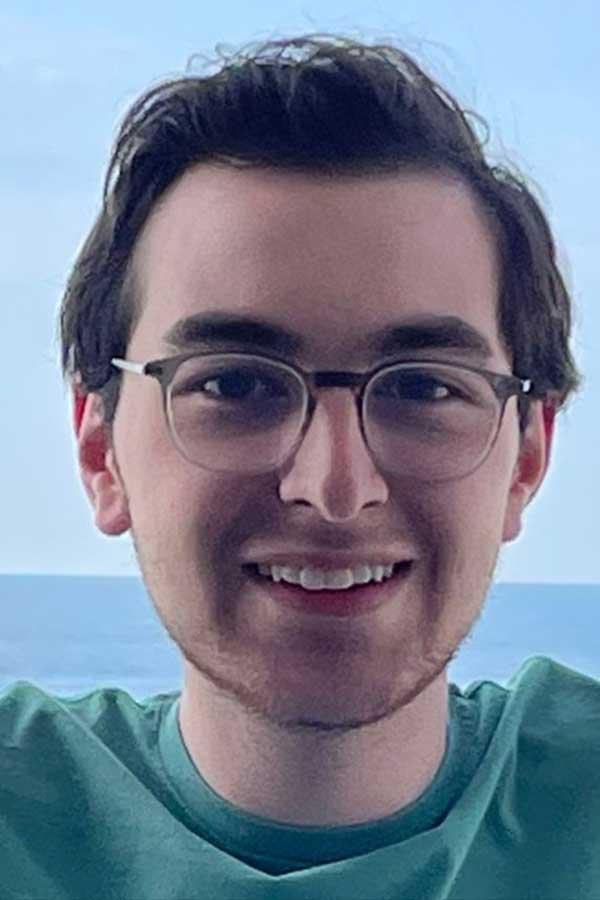
Nathaniel Goldfeiz, Immunology (Sorge)
The research involves studying low carbohydrate diets and whether they are able to reduce pain and increase the quality of life of amputees. The research will take form in two parts. First, the characterization of pain and psychological wellbeing in amputees will be assessed in addition to dietary habits. Secondly, a low carbohydrate diet will be assessed in whether it can help reduce pain and increase quality of life in amputees.

Ayona Rowchowhury, Neuroimmunology (Sorge)
The SHINE (Sex, Hormones, and Identity affect Nociceptive Expression) Project aims to provide a better understanding of transgender healthcare through the community in our area. The lab I work under conducts research on pain, with a variety of research topics, subjects, and applications. We have previously conducted studies comparing the pain responses of transgender women and cisgender women, and found that the former was phenotypically similar to the latter in all measures. However, hormone levels were not taken into consideration, and transgender men were not included. In SHINE, we will be exploring the pain responses of transgender and cisgender individuals while taking blood samples for the purpose of analyzing stress and reproductive hormones, immune cells, and cytokine release.
For my research project, I want to focus on the stimulated cytokine release. I have worked in gout research in the past, and during that project, we used monosodium urate to artificially stimulate the cytokine response. In this project, the stress is inflicted in vivo, which will introduce many other variables. For my own thesis, I want to be able to study and outline the cytokine release and compare it to the perceived stress of our participants. I want to report on the different types of cytokines and the demographics that express some more than the others. This will allow me to potentially establish a correlation between emotional and/or physical distress with immune markers, which can be extended to a study on the correlation between immune markers and chronic conditions.

Lara Aldouar, Neuroscience (Gamble)
My research focuses on determining the relationship between melatonin levels and smoking behaviors. Participants' saliva samples are used to measure their melatonin concentrations throughout different points of their circadian cycle which helps determine how smoking affects circadian characteristics in different races.
CAPPI 2022 Summer Research Academy Students
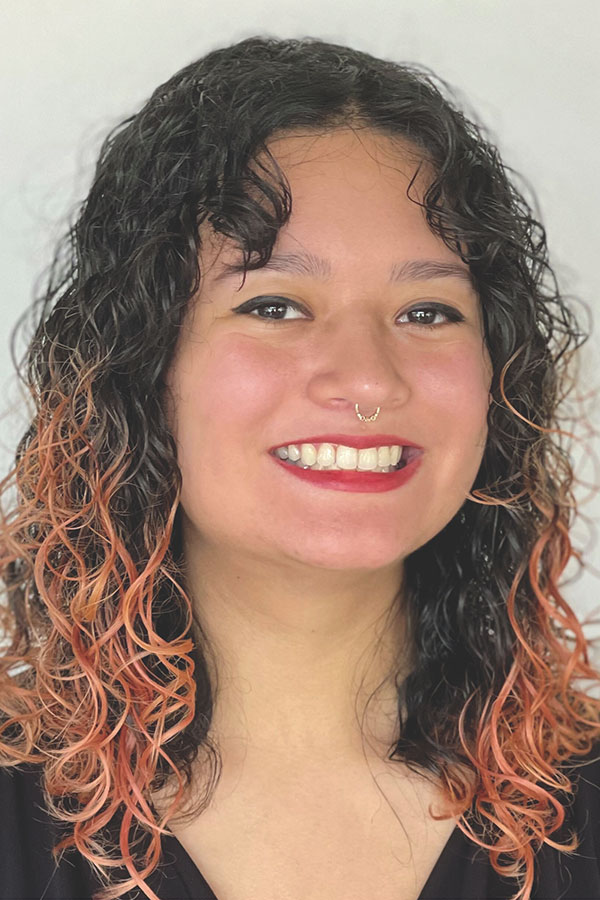
Victoria Gutierrez
My research project will be examining the relationship between perceived discrimination and ratings of daily pain. Discrimination has been indicated to have adverse effects on mental well-being, so I will be looking at whether it influences a physical aspect of health as well.
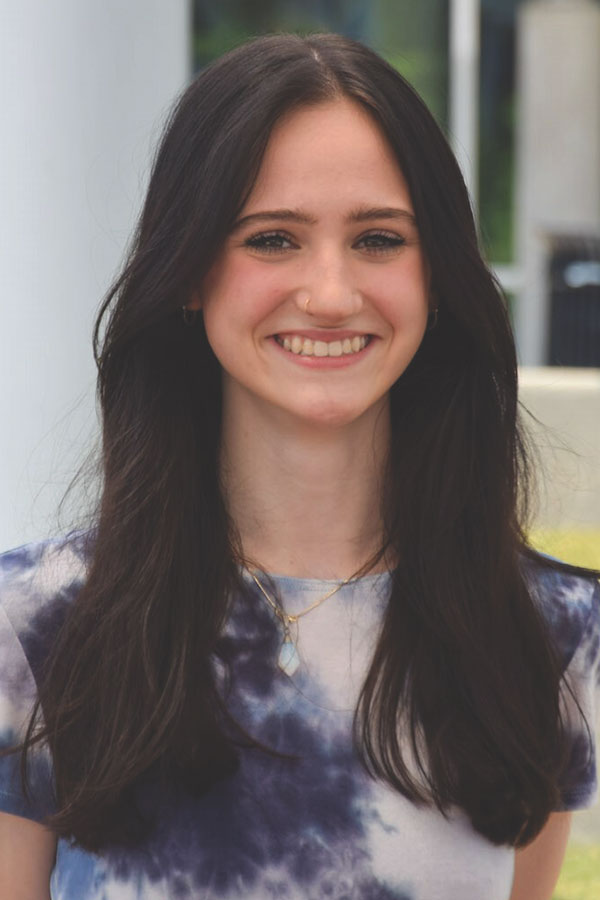
Maggie Gossage
My research is aiming to establish the basic knowledge and attitudes of people in the Appalachian area on psychedelics and psychedelic assisted therapies. As someone from this region who has seen the impact of the opioid crisis and the lack of mental health care, I am thrilled to be doing research to positively impact my community.
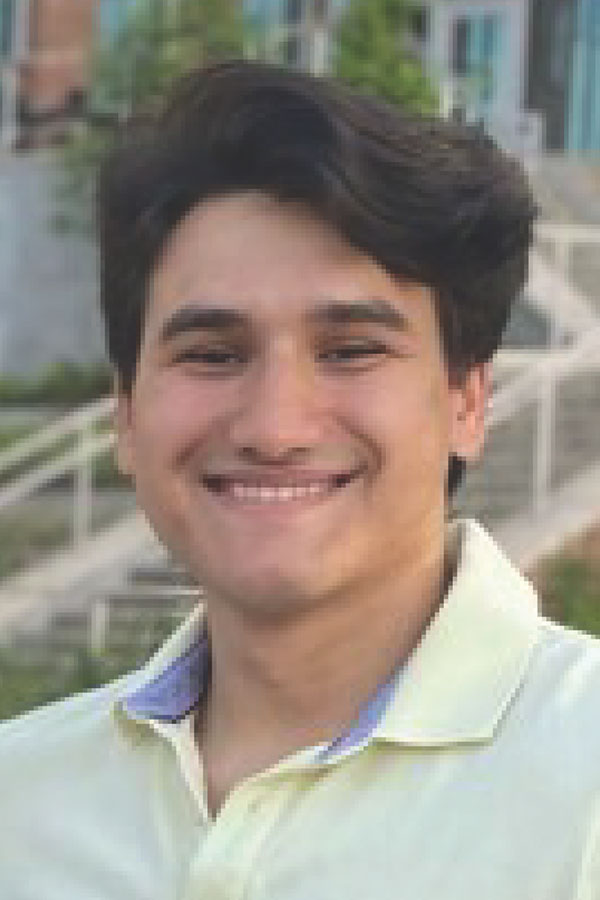
Ricardo Ortiz-Braidot
The research project that I am working on will be investigating the differences between idiopathic generalized epilepsy (IGE) patients and age –matched healthy controls (HCs) in diffusion MRI (dMRI) white matter characteristics and fMRI activation during executive attention, as well as their relationships with self-reported physical activity and cognitive function. My role will be analyzing dMRI and flaker task (FT) fMRI in the cross-sectional study of 12 IGE patients and 12 HCs to allow us to examine differences in white matter structural connectivity as well as in attentional processes. Additionally, we will also use Statistical Analysis System (SAS) to perform group statistical analyses with the demographic and behavioral data, and to run correlations and regression analyses to examine relationships between our variables of interest.
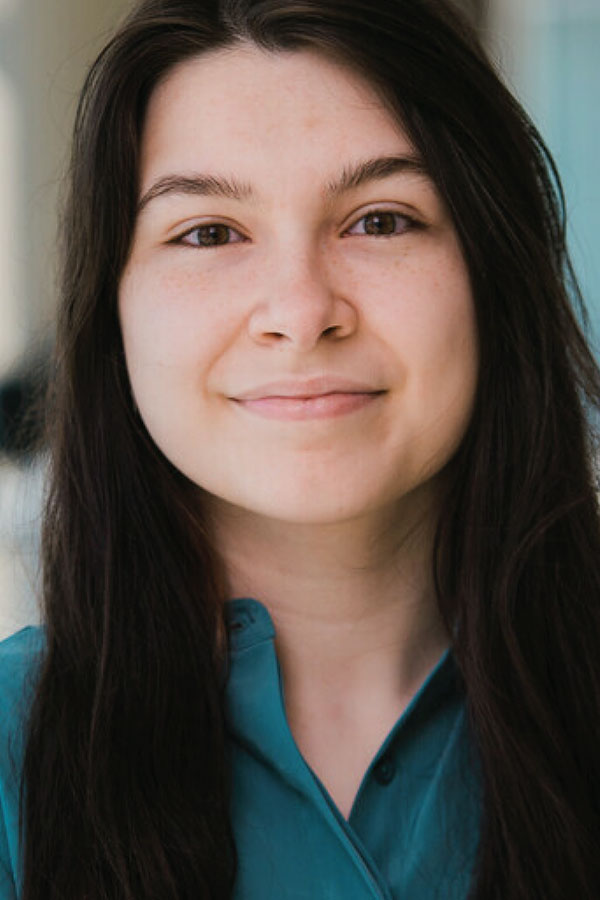
Vivian Ramsey
My research centers around the study of how the activity of norandrenergic cells in the nucleus of the solitary tract (NTS) is altered in freely behaving animals during free and motivated food consumption. To study this, I am working under my PI, Dr. Hardaway, and other mentors in my lab to record these cells during feeding trials using viral intersection tools and optogenetic recording methods.
CAPPI 2021 Summer Research Academy Students

Macy Banks (Cortes Lab)
My summer research project is focusing on the differences between our Alzheimer’s disease mouse model (5XFAD) and our TFEB overexpressed mice. TFEB is a transcriptional factor that is important in regulating proteostasis and autophagy. Our lab has generated a new line of transgenic mice that overexpress TFEB specifically in their skeletal muscle (cTFEB;HSACre mice), and we have observed marked improvements in brain function through aging. We hypothesize that a secreted factor originating in skeletal muscle can elicit neuroprotective responses in the central nervous system in response to Alzheimer’s disease pathogenesis. We will directly test this hypothesis using a cohort of single transgenic 5XFAD and 5XFAD;cTFEB;HSACre triple transgenic mice. We will measure a battery of established AD biomarkers in pre-symptomatic (3 months) and symptomatic mice (6 months), including intraneuronal amyloid-beta plaques, through tissue staining and ELISAs, as well as markers for neuroinflammation via immunostaining for reactive astrocytes (GFAP) and microglia (Iba1).

Jenna Gathright (Goodin Lab)
The current project I am working on is my undergraduate thesis in partial fulfillment of the requirements for Honors in Psychology. My thesis will focus on examining the impact of chronic pain stigma and HIV stigma on pain interference and depression.

Anish Myneni (King Lab)
With evidence suggesting that the inhibition of HuR may limit functional damage in neurodegenerative diseases, there is vast potential for application of this drug. Our lab is mainly focused on neuroinflammation in amyotrophic lateral sclerosis (ALS), so I am excited to be able to use this inhibitor this summer on an ALS mouse model and investigate if the results we have seen in the LPS model will translate into the ALS model. In addition to testing this inhibitor on potential anti-inflammatory effects in ALS, I will also be working on a project with Dr. King and Dr. Sorge to determine if this drug may also have an effect on acute and chronic pain. This summer I want to be able to progress my research and understanding on the potential avenues of application for this inhibitor while also expanding my knowledge of these fatal neurodegenerative diseases.
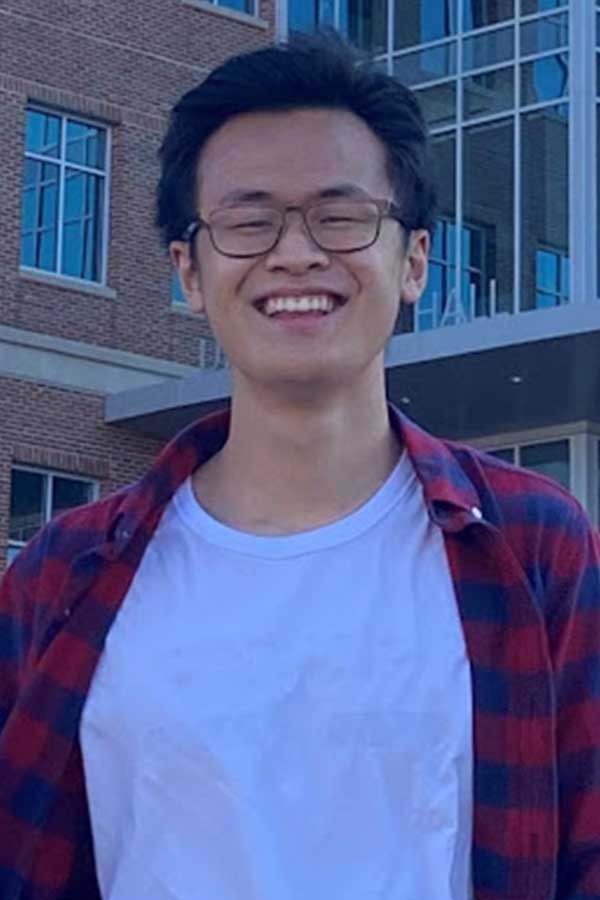
Ethan Wan (Day Lab)
I have two primary goals for my summer research experience. First, I will use single nucleus RNA sequencing datasets of rat NAc, from both repeated and acute exposures to cocaine, to build a single cell atlas. I will use this atlas to test the enrichment of cell type specific genes for genome wide association study (GWAS) phenotypes for neuropsychiatric, neurodevelopmental, and neurodegenerative diseases. As previously mentioned, the Science Advances paper, published by the Day Lab, identified that specific cell types are changed in response to acute cocaine. Thus, my second goal would be to build upon this information and extend findings in a repeated cocaine model, identifying cell type specific transcriptional programs altered by recurrent cocaine exposure. Exploring the brain on a cell-specific level was previously difficult due to its heterogeneous cell type composition. With single nucleus RNA sequencing technology and the platform established by the Day Lab, I believe my work will further develop our understanding of how these cell types contribute to addiction.